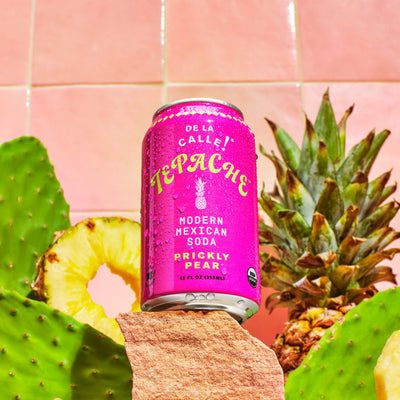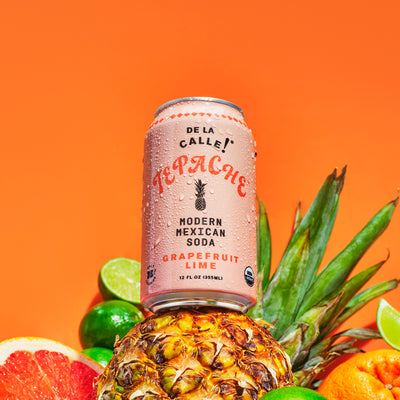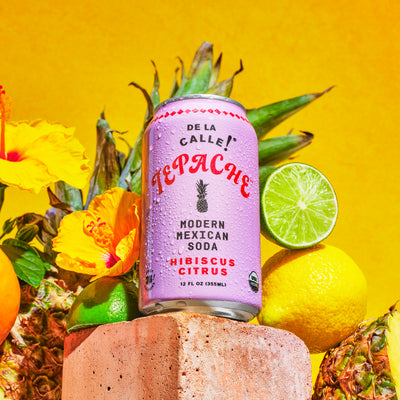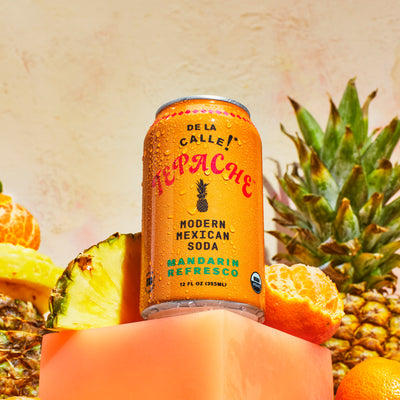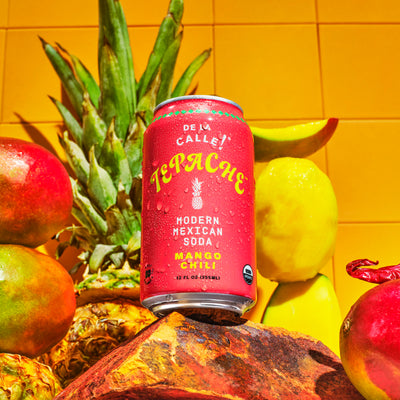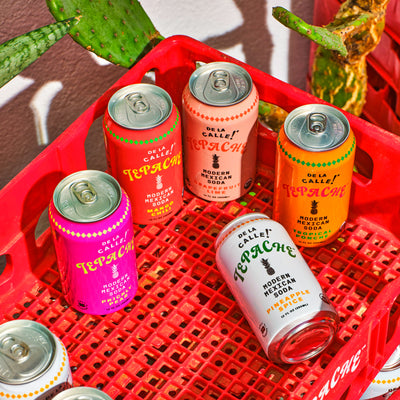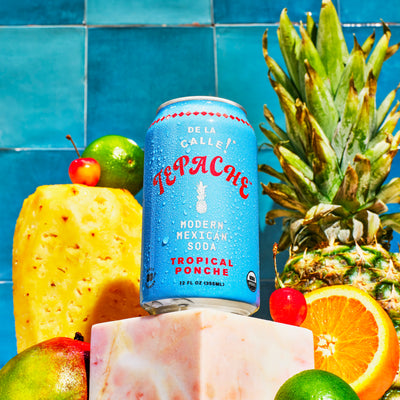Nopal Benefits That Might Surprise You!

You might have seen the plant that nopal comes from if you’ve ever taken a road trip through the southwest or Mexico. Nopal is made from the soft pads of the nopal cactus before it has ripened. The delicious cactus pear has long been used in the Americas by indigenous people for its amazing health benefits.
In this article, we’ll provide an overview of nopal and take a close look at some of the effects of nopal that might surprise you.
What Is Nopal?
Native to Mexico, the nopal cactus has two edible parts: the nopal cactus pads (also known as nopales) and the prickly pear fruit. Nopales are usually green or purple and are about the size of a person’s hand. They are crunchy and refreshing, with a texture somewhere between a green pepper and a green bean.
Prickly pear fruit has a sweet and subtle flavor, similar to a melon. Although you might guess they are part of the pear family from the name, prickly pears got their name from their long, oval shape and size. While they might seem strange and exotic, you can often find them in grocery stores.
What Are the Benefits of Nopal?
Although the delicious flavor of nopal would be enough to make you want to eat this tasty cactus every day, they are also packed with health benefits. Nopal cactus naturally contains:
- Calcium
- Vitamin C
- Vitamin A
- Vitamin B6
- Vitamin K
- Potassium
- Riboflavin
- Magnesium
Given its impressive health profile, it’s not hard to see why nopal cactus is a superfood. In this section, we’ll dive into some of the most impressive health benefits of nopal, a versatile Mexican cactus.
Nopal Is Packed With Antioxidants
“Antioxidant” has become a buzzword in the health world recently, but what exactly are antioxidants? Essentially, antioxidants are substances that can either prevent or slow down cell damage caused by free radicals. Free radicals are unstable molecules that your body produces in response to different environmental factors and external pressures.
The most important thing to know about free radicals is that they can cause oxidative stress, which can contribute to heart disease, cancer, arthritis, stroke, respiratory diseases, immune deficiency, emphysema, Parkinson’s disease, and other conditions.
Antioxidants can neutralize these free radicals, protecting your cells from potential damage. Although your body can naturally produce some antioxidants, it can be beneficial to incorporate foods with antioxidants into your diet as well. That’s where nopal comes in! Luckily, the nopal cactus is packed with antioxidants.
Along with helping your body fight off potential disease, the antioxidant characteristics of nopales also mean they can help your body fight off symptoms of aging. Free radicals can impact your skin by producing wrinkles and age spots. For this reason, eating antioxidant-rich nopal cactus may help you keep your skin healthy and clear.
Nopal and Cholesterol
The older you get, the higher your risk for developing high cholesterol. Cholesterol is a substance naturally found in your blood that your body needs in small amounts. However, when there is too much cholesterol in your blood, you can increase your chances of developing heart disease.
One easy way to fight high cholesterol is to incorporate foods with soluble fiber into your diet. This soluble fiber can help your body lower cholesterol levels. All cacti, including nopal cacti, are naturally fibrous. The soluble fiber in nopales can help you regulate your cholesterol levels.
If you experience digestive problems, the fiber in the nopal cactus might also be able to give your digestive system a boost. Dietary fiber can add bulk to bowel movements which may make them easier to pass.
Nopal Might Help With a Hangover
Although a hangover is never fun, you might find that the cactus fruit from the nopal cactus can help you combat the effects of one too many tepache cocktails. Given that prickly pears have natural anti-inflammatory properties, they can help you fight off the headache that often accompanies the worst hangovers.
However, if you’re looking to make use of the anti-inflammatory effects of the nopal cactus, there’s one thing you have to keep in mind. The hangover-reducing side effect of prickly pear works best if you ingest it before drinking alcohol, so you may want to factor prickly pear into your meal plan the day before you drink.
Nopal Has Antiviral Properties
Nopal also has antiviral properties that can help your immune system fight off harmful viruses.
Preliminary studies have found that nopal cactus may have antiviral activity against herpes simplex virus (HSV), respiratory syncytial virus (RSB), and HIV.
Additionally, the nopal is packed with vitamin C. Vitamin C can help your immune system fight off viruses.
Nopal May Help Keep Your Blood Sugar in Check
Another amazing health benefit of nopal is that it may help you keep your blood sugar levels in check. Blood sugar, also known as glucose, fuels all of the cells in your body. As you can imagine, you need a healthy level of glucose in your body for it to function properly.
However, when your blood glucose levels are too high, there can be harmful effects. If you consistently have too much glucose in your body, the cells in your pancreas will slowly lose the ability to produce insulin. This can lead to permanent pancreas damage.
High blood sugar can also cause your blood vessels to harden. This process is known as atherosclerosis. Damaged blood vessels may lead to kidney disease, stroke, heart attack, weakened immune system, and more. For this reason, it is important to maintain low blood glucose levels.
Nopales naturally have a low glycemic index. Glycemic index (GI) is a value that measures how much a specific food increases your blood sugar levels. The lower the glycemic index of a food, the less it may affect your blood sugar levels.
If you want to regulate or lower blood sugar levels, eating foods with a naturally low GI, such as the nopal cactus, may be beneficial, especially if you struggle with type 2 diabetes or obesity. Of course, this isn’t a substitute for diabetes medications, but it might be a helpful addition to your health management plan.
Nopal and Prostate Health
If you want to keep your prostate healthy, especially as you age, the nopal may help you. The prostate is a gland and an integral part of the male reproductive system that sits just below the bladder. Your prostate gland can become enlarged, which can lead to discomfort and a more frequent need to urinate.
Although there are prescription medications that can treat an enlarged prostate, nopal may be a natural treatment method. It may also help treat prostate cancer, a type of cancer that affects about one in eight men.
What’s the Best Way To Get the Benefits of Nopal?
Now that you know about all of the benefits of nopal, you might be wondering how you can incorporate this superfood into your diet. If you’ve ever seen a cactus in person, you might be thinking that there’s no way you can cook with a prickly, spiky plant.
Luckily, there are plenty of ways you can enjoy both nopales and prickly pear fruit. If you want to cook with nopales, you can treat them like a cross between a green bean and okra. Their slightly sour, acidic taste means that nopales are delicious when broiled or roasted.
You might also want to try a dry cooking method like grilling to draw the flavor out of the cactus. After throwing it on the grill, you can saute the nopalitos to enhance the flavor. Nopales make a delicious topping for tacos, burritos, and nachos.
You can also eat prickly pear fruit raw, just like you would other fruits. The thorns are the only thing to beware of when you’re eating prickly pears. To remove the thorns, use tongs to brush all the thorns off before you peel a prickly pear.
When you cut a prickly pear open, you’ll see that it has small, black seeds. You can either strain or discard these seeds to get only the sweet fruit. They are delicious both fresh and mixed into jams and jellies.
Prickly Pear Cactus Tepache: Nutritious and Delicious
Another delicious way to enjoy prickly pear is with Prickly Pear Cactus tepache, made with fresh nopales. This delicious tepache flavor is sweet, tart, and sure to please. Given that it is a vivid, pink flavor, this type of tepache also makes the perfect addition to a beautiful summertime cocktail.
Tepache is a fermented Mexican beverage made from pineapples and often sold on the street. Since it is fermented, Prickly Pear Cactus tepache has a bubbly, subtle texture that makes it refreshing but not quite as funky as other fermented beverages such as kombucha.
Conclusion
Nopal is a Mexican cactus that produces both nopales and prickly pears. Along with its delicious flavor, nopal cactus has several amazing health benefits. If you struggle with high cholesterol or high blood sugar levels, incorporating nopal into your diet may help you control both of these.
The powerful antioxidant properties of nopal can also help your body fight off the harmful effects of free radicals, including disease and skin aging. If you find yourself hungover after a night out, nopal might also be able to help with that.
Just in case you’re not sold yet, nopal also has antiviral properties and may be able to help with an enlarged prostate. For all these reasons and more, incorporating nopal into your diet may be an easy, delicious way to give your whole body a boost.
If you want to consume more nopal but are intimidated by the thought of cooking with cactus, you can try Prickly Pear Cactus Tepache, a fermented, refreshing beverage packed with incredible benefits.
Sources:
High cholesterol - Symptoms and causes | Mayo Clinic.


